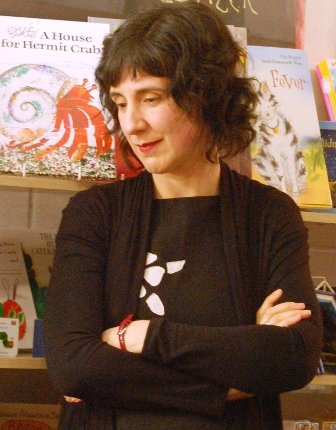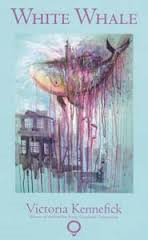Meet the Poet |6| Victoria Kennefick
Victoria Kennefick’s poems have been published or are forthcoming in Poetry (Chicago), The Stinging Fly, New Irish Writing, Bare Fiction, The Penny Dreadful, And Other Poems and elsewhere. She won the Red Line Book Festival Poetry Prize 2013 and was shortlisted for the Melita Hume Poetry Prize 2014. Her pamphlet, White Whale, won the Munster Literature Centre Fool for Poetry Chapbook Competition 2014. It is shortlisted for a Saboteur Award for Best Poetry Pamphlet and you can vote for it until 24 May 2015 here. It is available for purchase from Munster Literature Centre. There’s a recent review of her pamphlet in Ambit magazine.
1. Your chapbook is remarkably beautiful, everything from the words and the placement of the poems, to the weight of it all gathered together, can you tell us a little about the journey to creating your first poetry book?
Thank you so much for those lovely words, I appreciate your thoughtful reading of White Whale. This journey has taught me the valuable lesson that patience must be practiced; earned. I waited many years before submitting poems for publication and bided my time until the right opportunity for publishing a pamphlet came along. The poems in this chapbook were written over the past seven or so years, many while my Dad was ill and dying. Once I settled on the title White Whale, which has come to represent an entity that comes in many forms but haunts us all in different ways, I found the focus of the book, and the poems just congregated like a shoal of fish. It wasn’t an easy process but it was certainly a natural one. I gained so much from the experience of collating and editing the poems, and I am so grateful to all at the Munster Literature Centre who assisted me.
2. When I was reading your poems I was constantly brought back to recurring images of your parents, childhood, the Whale and especially the sea, I even noticed that in an earlier interview with Philip Cummins your very first poem was about the sea. What is it about the sea and the whale and childhood that draw you to them?
The sea is my context; it is how I understand time and space. My family spent so much time on the beach, picnicking, walking, paddling and swimming. My sister and I would go there daily during the summer. It was our playground.
[pullquote] I think the sea watches us and reflects us back to ourselves [/pullquote] I know many people in Shanagarry and particularly in Ballycotton, who have a different, working relationship with the sea. It is their livelihood, their master, and I have observed that with awe and with interest. A small element of that has seeped into my work too I suppose: their abiding respect for the ocean.
I think the sea watches us and reflects us back to ourselves, so my first collection of poems had to engage with that in some form. I can’t imagine life, or my poetry, without it and to some degree the image of the Whale reflects that.
3. Do you feel that these poems are very much a reflection of your own life, or is it a separate identity? And how do you go about deciding what bits to reflect or which bits to create?
The poems that are the most honest and real are the ones that people remember; the ones that readers say moved them. That doesn’t mean they aren’t artful, or that they are completely truthful, but rather that they come from a place that is genuine, even if the specifics change. I decide which elements of my life to reflect or create based on what is best for that poem, though it took me a while to figure that out. It pays to be a little fearless I’ve discovered; I’m still working on that.
4. You’ve won a staggering amount of awards? Did you feel this was the best way to get your work out there?
You’re very kind! I wouldn’t say staggering exactly, rather I have entered a number of competitions and have been lucky enough to win, or be placed, in some of them. It is a very subjective business; I have no delusions about that. Competitions have their place and I am very grateful for the opportunity to have my work read by some of the best poets of our time. I think competitions suit some temperaments, and not others. I work well with deadlines and with feedback, so I like the structure of the competition process. It forces me to work through poems I may have left to drift. Competitions encourage a certain level of focus, though I’m taking a little break from them now to concentrate on publication.
5. Did you simply fall into being a poet, or was it a less natural process. I noticed that your parents both seem to have filled you with a love of poetry. Can you tell us about that?
[pullquote] When my father was very ill, and forgetful as a result, we all found reciting his favourite poems so healing. Recitation is another form of prayer. [/pullquote] I have always written poems. It is my job to write them, so yes, it is a natural process. I was blessed to grow up in a house where both my parents had a real love and affinity with language. My maternal grandmother adored poetry, and though I never met her, my own mother knows many poems, or fragments of poems, as a result of her influence. She often recites them still and I find hearing them so soothing and hypnotic. I suppose they were my lullabies. My maternal grandfather was a teacher who used to cycle all over Ireland for first editions, so writing and reading was normal in our house. My father was a very witty man, really tickled by puns and such, as am I. He loved very structured poetry that had strong rhyme, like Robert Service. He got a real kick out of reciting these poems in his deep, husky voice. When my father was very ill, and forgetful as a result, we all found reciting his favourite poems so healing. Recitation is another form of prayer.
6. There’s something about the darker aspects of your poetry that put me in mind of Sylvia Plath (in a good way, and not a relentlessly depressing way) is that something you’ve consciously developed?
I am hugely flattered by that, thank you. I was writing poetry long before I encountered Plath’s work when I was about sixteen or seventeen. I remember reading Ariel for the first time. It was just amazing, a game-changer. I fell hard. Of course at that age I did my best to make my emerging voice merge with hers, with very mixed results! I brought some of those poems to a writing group I was part of at University and an American poet said they reminded her of Anne Sexton, whom I had not heard of at the time. I went straight to the library the next day and read everything I could find by Sexton. So, yes, I consciously tried to emulate both Plath and Sexton at the beginning. Now, I think they still slip in here and there and I’m glad of that. They were very much part of my apprenticeship as a poet, so I’m happy if my work still resonates on their frequency. I talk to them quite often, Plath in particular.
7. Do you write every day? I see you’re an actor and a teacher too – how do you balance all this and still have time?
[pullquote] Poetry is just poetry. It’s important, it’s vital, but no one is going to die because I’m not writing. [/pullquote] I write most days. I try to make space rather than time for writing – time is such a loaded word in the modern world. Like everyone I know, I am very busy with work, family, and other commitments. One thing I will say about this is that I was lucky enough to do a poetry workshop with Don Share, Editor of Poetry, at the Cork Spring Poetry Festival and he discussed this very issue with the group. He said that when we are not writing poetry, we are living our lives, and that that is okay. Poetry is just poetry. It’s important, it’s vital, but no one is going to die because I’m not writing. If I feel bad about not writing, then I’ll write.
8. Do you find that poetry always brings you back to memories? A lot of your work seems to be an exploration of the past and how it’s shaped you?
 My pamphlet is certainly that, excavating memories to archive them, hold them safe. It is very much a book for my Dad, it is dedicated to him, even though I still find it impossible to really write about him or about what we all went through when he was ill. White Whale does try to engage with those difficult experiences through its exploration of the past, though it was very scary and a lump-in-the-throat process. I still find ‘Rib’ hard to read without choking up. My mother and sister find it very difficult to listen to at readings.
My pamphlet is certainly that, excavating memories to archive them, hold them safe. It is very much a book for my Dad, it is dedicated to him, even though I still find it impossible to really write about him or about what we all went through when he was ill. White Whale does try to engage with those difficult experiences through its exploration of the past, though it was very scary and a lump-in-the-throat process. I still find ‘Rib’ hard to read without choking up. My mother and sister find it very difficult to listen to at readings.
My sister and I are the last of our generation on both sides of the family, so we have been surrounded by older people all our lives and that certainly has an impact too. Being the youngest means that you are a witness to the end of things; the demolition of a house, the loss of relatives, the things people leave behind. It has always fascinated me; I want to keep everything, so poetry facilitates that in a way. Even as a child, in my very early poems, I saw my role as the recorder of the family’s history, a hoarder of some kind. Even so, my newer poems have moved away from this place and are much different. I think my past might get a break for a while!
9. You’re another twitter fiend? Can you tell me about its place in your poetic life? Do you see it as a tool to expose your work to others? or is it about starting a conversation for you? What do you make of all the self promotion that goes on in the Irish poetry world via twitter?
Twitter has a small but significant place in my poetic life, in that it has afforded me many opportunities to publish and share my work and enjoy the work of others I may not have encountered in other circumstances. It was particularly lovely to attend the Cork Spring Poetry Festival in February this year as I met so many Twitter friends IRL. White Whale has been shortlisted for a Saboteur Award for Best Poetry Pamphlet; the ceremony is in London at the end of this month. It’s nice and reassuring to know I already have readymade friends to meet there.
To respond to the last part of your question, I fully support any and all self-promotion that goes on in the Irish poetry world via Twitter. Who else is going to promote our work? And where else can you share your joy at having something published or your disappointment that you didn’t make a shortlist? I don’t have a problem with people spreading their good news or questioning the status quo, I think it’s healthy. I want to support my colleagues, as they cheer me, so I am a big fan of the Retweet function.
10. Have you met any of your poetry heroes and how was it?
 Yes, I am very lucky in that regard. I have had the good fortune to meet so many poets I admire, particularly as a member of Listowel Writers’ Week and as a result of attending events like the Cork Spring Poetry Festival. I have a terrible habit of becoming extremely gushy when I meet poets whose work I enjoy. They have all been gracious and generous when faced with this, I must say. I know I probably alarmed the very kind Sinéad Morrisey and I had to talk myself into calmness when I met Emily Berry whose début collection from Faber, Dear Boy, is a treasured book. I was also a little intimidated about meeting Don Share, but he is, without question, one of the most humble, intelligent and kind people I have ever met, a superb editor, teacher and poet.
Yes, I am very lucky in that regard. I have had the good fortune to meet so many poets I admire, particularly as a member of Listowel Writers’ Week and as a result of attending events like the Cork Spring Poetry Festival. I have a terrible habit of becoming extremely gushy when I meet poets whose work I enjoy. They have all been gracious and generous when faced with this, I must say. I know I probably alarmed the very kind Sinéad Morrisey and I had to talk myself into calmness when I met Emily Berry whose début collection from Faber, Dear Boy, is a treasured book. I was also a little intimidated about meeting Don Share, but he is, without question, one of the most humble, intelligent and kind people I have ever met, a superb editor, teacher and poet.
I count visiting Plath’s grave as meeting her too, I couldn’t stop crying. It was on my honeymoon and I was inconsolable, a beautiful hurt. I have a very understanding husband.
- 11. Do you journal or carry a notebook or take notes and if so, how do you feel this effects your writing?
I do have a small journal, but I am chronically disorganised so I often leave it somewhere or can’t find it in my bag, so I often scribble phrases or ideas on receipts, bus tickets and in the middle of shopping lists. I also use a notebook widget on my phone, so there are lots of scraps on there. I also keep a pad next to my bed. Many a poem has arrived just as I am drifting off to sleep.
12. What poem in the collection came easiest to you and why?
‘Beached Whale’ was one of those poems that came almost fully-formed at night, just before I fell asleep. I didn’t even turn on the lamp. I wrote it in the dark, hoping I would be able to decipher it come morning. I didn’t want light to spook it. Poems are tricksy that way.
13. Do you constantly revise your work, it seems very crafted and like you’ve spent a lot of time – I particularly love the surprising sounds your words seem to make if you read them out loud, is rhythm and sound something that you work at filling the poems with?
[pullquote] I don’t know if poems can ever be exactly how they should be, they are like people in that sense. We think we should look a certain way, act a certain way, but we are not perfect; we are works in progress and in process, so sometimes it’s the imperfections that make a poem. [/pullquote] Yes I do, I revise and revise, then revise again. When I submit to a magazine or journal only after considerable editing, I immediately spot things I’d like to change. Then I continue to revise. I don’t know if poems can ever be exactly how they should be, they are like people in that sense. We think we should look a certain way, act a certain way, but we are not perfect; we are works in progress and in process, so sometimes it’s the imperfections that make a poem. I try to take great care in making sure the poems are as good as they can be at the time, but overworking a poem is unhelpful too. It’s a delicate balance.
Sound and rhythm are hugely important to me. I went to Speech and Drama class as a child and that’s one of the ways I fell in love with poetry, through reciting it. Now I always read my poems in progress aloud, and then to my husband. I cannot overestimate the fact that I have a very understanding husband. He would definitely agree that I fill my poems with sound. I am very noisy.
14. What’s the worst reading you’ve ever done? And why? Was it disaster after disaster, an embarrassing Freudian slip or something else entirely?
I have not had a bad experience reading my work, yet. It would take something really dramatic for me to consider it my ‘worst’ reading, or a disaster. I embarrass myself at work every day so I really have no shame anymore when it comes to public speaking. My most embarrassing ‘performance’ involves mime and interpretative dance…but that’s another story I’ll never tell.
Remember to vote for Victoria in the Saboteur Award for Best Poetry Pamphlet. You can vote for it until the 24 May 2015, here.


